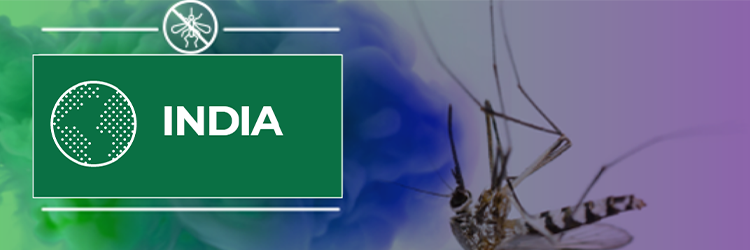India’s population suffers from a significant death rate, partly because of vector-borne diseases transmitted by mosquitoes. Infectious diseases like malaria, filariasis, kala-azar, Japanese encephalitis, chikungunya, and dengue are present in the country. According to WHO’s World Malaria report, India accounts for 4% of the global malaria burden in 2017. To prevent the proliferation of mosquito-borne diseases and to improve the quality of public health, mosquito control is essential in the country.
The National Vector Borne Disease Control Programme (NVBDCP) and the department of Ministry of Health and Family Welfare (MOHFW) of the government of India are responsible for planning vector control programs across various parts of the county. The Central Medical Services Society (CMMS), a central procurement agency under the Department of Health & Family Welfare, undertakes the procurement of mosquito control insecticides for both adulticide and larvicide programs. CMSS, at the central level, procures selected insecticides such as synthetic pyrethroids, malathion, and pyrethrum for vector control. The selection of mosquito control insecticides for the central level and states is done mainly by tenders that are floated by the individual state public health departments and the NVBDCP.
Sales of insecticides for mosquito control grew at a CAGR of 5.6% from 2012 to 2018. Popular brands for insecticides include Hilmala adulticide, based on the active ingredient malathion, the most procured insecticide by mosquito control professionals for outdoor fogging. It is followed by Heranba Industries product Alpha, Gharda Chemicals product Alphaguard (Ultima), and Tagros Chemicals product Rubi, based on the active ingredient alphacypermethrin.
Since 2017, the use of adulticides has grown over larvicides due to a higher dependency on indoor residual spray (IRS) and fogging or space spray for vector control in rural and semi-urban areas. However, larvicides are also picking the pace as they are easy to use and require less manpower for mixing the insecticides on stagnant or polluted water bodies.
Heranba Industries is the largest insecticide supplier of mosquito control products in India in 2018, followed by Hindustan Insecticides, Gharda Chemicals, and Tagros Chemicals. Due to its lower bid prices for tenders, Heranba is the largest supplier of alphacypermethrin to vector control bodies in India. Alpha, its product based on alphacypermethrin, has the highest sales. Hindustan has lost its leading position for insecticides sales since 2017, mainly due to a decrease of DDT sales, as its use has been restricted. However, Heranba still sells 500-700 MT of DDT only to the government for usage in the areas where mosquito outbreaks are significantly high. Gharda Chemicals’ Alphaguard (Ultima) has reported the highest sales due to the demand for alphacypermethrin products, as they are available at lower rates. Temeguard, its larvicide product based on temephos, is largely used for larvae control programs.
Along with chemical insecticides, NVBDCP is also promoting the use of long-lasting insecticide-treated mosquito nets (LLIN) in the high malaria-endemic area and provides 100% central assistance.
The total insecticide market for vector control in India is expected to grow at a CAGR of 3% during the forecast period (2018-2023). The market for adulticides is expected to grow at a CAGR of 3%. It is anticipated that the market for synthetic pyrethroids will increase due to their long-lasting properties with low dose rates. Synthetic pyrethroids such as alphacypermethrin, deltamethrin, and lambda-cyhalothrin are widely used for IRS and impregnation of bed nets because they provide better results after several washes and are less toxic compared to traditional chemicals like malathion and DDT. Larvicides are expected to increase at a CAGR of 3.5% during the forecast period. The key driving factor is the widespread use of larvicide products, mostly BTI and temephos, in metropolitan cities and urban areas to reduce mosquito breeding.
For more information follow the link to our new study on Mosquito Control: Global Market Analysis Opportunities, that provides professional mosquito control/disease vector pesticide suppliers and formulators with the latest information on product usage for the mosquito control market with the breakdowns for adulticides and larvicides. Countries included in the report are Brazil, India, Indonesia, Malaysia, Mexico, Thailand, and the United States.

